Looking for a quick way to make your organization a better place to work? Fair hiring to the rescue!
By making your workplace more inclusive and diverse, you’re not only complying with the law, but you’re also putting yourself out there as a great employer.
Here is everything you ever wanted to know about fair hiring and fair chance hiring (hint: they’re not the same thing!)
TL;DR – Key Takeaways
- Fair hiring means giving candidates of all backgrounds equal job opportunities.
- It’s not the same as fair chance hiring, which relates to hiring candidates with a conviction history – and giving them an equal shot at getting a job!
- Different countries around the world have their own fair chance legislation, but the USA is leading the way with the California Fair Chance Act.
- Benefits of fair chance hiring practices include a wider talent pool, compliance with the law, better employer branding, more engaged employees, improved innovation, productivity and more.
- Some common mistakes to avoid are relying on gut feeling, allowing unconscious bias, having poor job descriptions, and asking inappropriate questions during job interviews.
- For a fair hiring process, we recommend following best practices, such as setting goals for fair hiring and diversity, using skills assessments, standardizing your hiring processes, banning the box in your application process, and expanding your talent search.
- Toggl Hire can help empower your fair hiring with skills-based tests for a variety of different roles, so you can hire based on evidence and job performance rather than gut feeling.
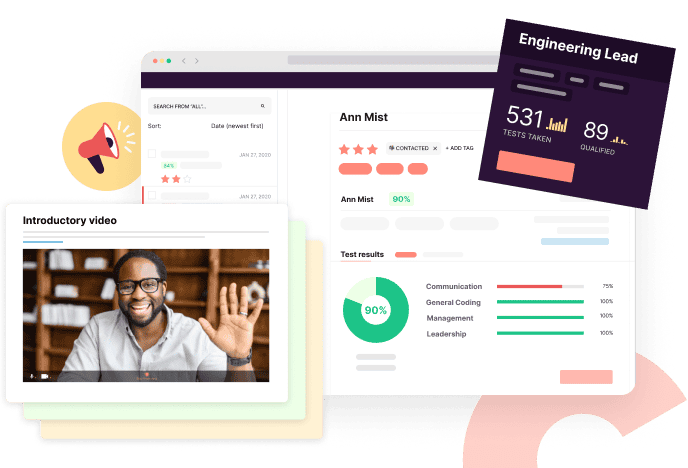
What is fair hiring?
Fair hiring broadly means giving all candidates the same opportunity to get a job, regardless of their background, education, age, race, skin color, religion, etc. It means looking past the character and physical traits of a person and focusing on whether or not they’re capable of doing the job when evaluating them as candidates.
This means following the 3 principles of fair hiring:
Meritocracy: a system where people are valued based on their abilities and not their social position, affluence, or innate characteristics.
Diversity: hiring with a reduced bias for candidates’ gender, age, race, religion, sexual orientation, and other.
Inclusivity: hiring employees with diverse backgrounds, perspectives, and origins.
What is fair chance hiring?
Fair chance hiring specifically relates to hiring candidates with a criminal record. In many countries around the world, it exists as a framework to help those with a conviction history to find employment.
As these candidates are often marginalized, fair chance hiring acts provide them with an equal employment opportunity to find work while fighting the stigma around people with conviction records.
It’s a different concept from fair and blind hiring practices but could be considered a part of fair hiring practices.
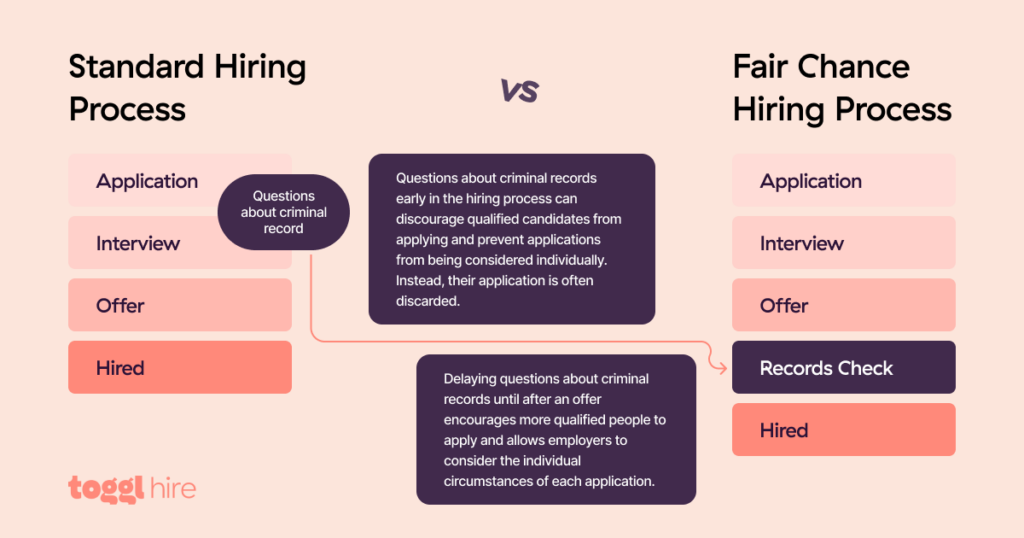
Especially in the United States, fair chance hiring legislation is incredibly important. The criminal justice system in the United States is disproportionally discriminative towards black and Latino populations, which trickles down to discrimination when hiring people.
Fair chance hiring: the law around the world
Fair chance hiring practices – and even more importantly, fair chance laws – differ worldwide. To make sure you’re compliant, take time to investigate fair chance hiring laws in your area.
Here are some of the most common fair chance hiring laws around the world.
1. US – managed under the Fair Chance Act, also known as the “ban the box” law from 2018. There is also the Fair Credit Reporting Act, which gives job applicants some notice that someone wants to do a background check on them before it takes place, giving them the choice to consent or not.
2. Canada – while it doesn’t have a comparable Fair Chance Act, there are many provincial and local laws protecting everyone with a criminal record.
3. UK – some petitions took place, but no official acts or laws exist.
4. EU – discrimination is handled under the European Employment Equality Directive. While it doesn’t handle discrimination against people with criminal history, some EU countries can interpret this as a form of discrimination.
5. Australia – handled by the Human Rights and Equal Employment Opportunity Commission.
The benefits of a fair recruitment process
A fair recruitment and selection process results in better hires, but the effects span throughout an entire company’s operations. Here are the main job-related (and more general) benefits of a fair hiring process.
Wider talent pool
By becoming a fair chance employer, you consider a wider range of candidates by default. This makes it more likely that you’ll find someone highly qualified that you would have otherwise missed with a less inclusive approach.
Legal compliance
Staying compliant with your local and federal laws (such as the Fair Chance Act in the United States) is not just nice to have, it’s a must if you want to stay on the safe side of hiring and avoid lawsuits and government penalties.

While just embracing these practices won’t help you stay out of trouble, it helps private employers reduce certain risks.
Stronger employer branding
Companies that are dedicated to fair hiring practices and inclusivity in the workplace have better reputation as employers. Once you publicly disclose your blind hiring practices, you’ll be able to attract top talent more easily in a crowded market.
Higher employee engagement
If you embrace fair chance hiring practices in your workplace, this means that your people can trust you as an employer. In front of the public eyes and in front of your own employees, you’ll come off as an organization that values diversity, fairness, and inclusivity.
Increased productivity and innovation
Recent research shows that more diverse teams deliver more innovation, earn more revenue, and make better decisions. Given the difference in viewpoints and backgrounds, they come up with more unconventional ideas, and they are more likely to execute them.
Cost savings
It may seem like introducing fair chance hiring practices leads to more complications and expenses. It’s actually the opposite. With a more diverse workforce, you can save money down the line.
The candidates you get will be less likely to leave and they can perform better on the job compared to a more homogenous workforce.
Common mistakes that lead to unfair hiring practices
If you’re looking to introduce a fairer hiring process, you’ll want to avoid these common mistakes businesses make regarding inclusivity and diversity.
Unconscious bias
Unconscious biases are very common in hiring. And while they are seemingly innocent, they can lead to catastrophic hiring decisions.
To check against unconscious bias, it’s best to start the hiring process with a skills test rather than a resume review – so you can judge based on performance, not character traits.
Over-reliance on gut feeling
You may think you know instinctively if someone is an amazing fit. But even if you’re a seasoned HR expert with direct experience in the field, your instinct can be wrong.
Relying on your gut feeling when hiring is a very expensive bet. A mis-hire can cost months and thousands of dollars in hiring costs.
Poor job descriptions
The words you use in your job description can have a major impact on who applies for the job. As research shows, certain phrases can discourage certain genders and members of certain groups from applying.
Take your time with each description and use tools such as Textio to ensure they are as neutral as possible.
Inappropriate job interview questions
Asking someone if they are married or if they have any criminal conviction record may seem important, but in reality, it’s very much illegal and gives candidates the wrong impression about you as an employer. Even if they get the job offer, they may reject it as a result of forming a poor impression of you as an employer.
To avoid asking inappropriate job interview questions, brush up on what you’re allowed to ask and what’s not okay, or ask an HR professional to take a look at your questions before the interview.
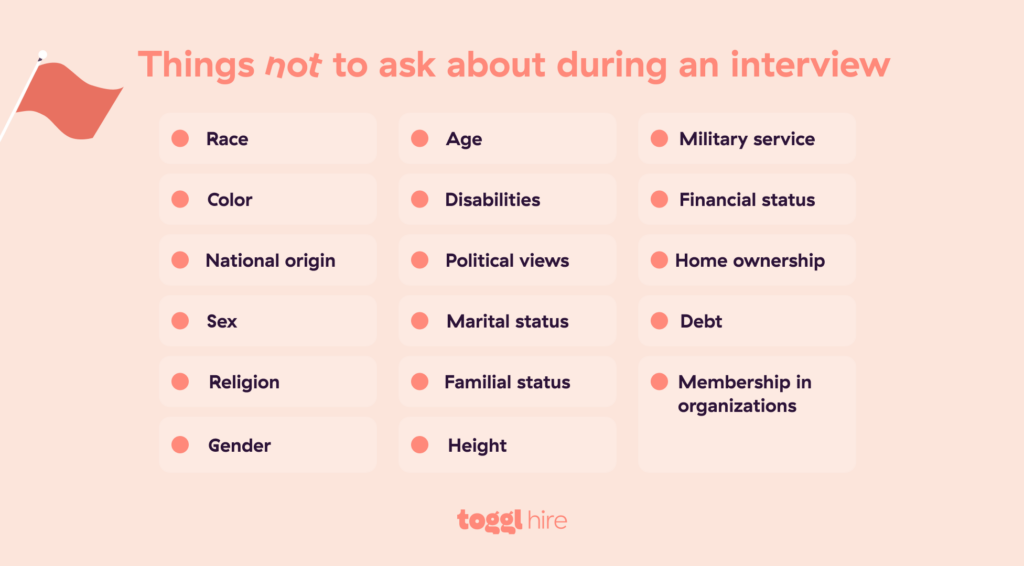
Lack of diverse hiring strategy
Before setting out to become a fair chance employer, you need to do the bare-bones research and create a diverse hiring strategy.
From job descriptions to interviews, onboarding, and the offer, create a plan on how you will attract diverse candidates to your workplace.
11 Best Practices for a fair hiring process
If you want to minimize bias while hiring, make better hiring decisions, have a more diverse pool of candidates and employees, and foster inclusive workplaces, help is coming your way. Here are the very best practices that will improve your hiring process.
#1 – Set fair hiring and diversity goals
The best way to get started with fair hiring practices is to set goals for your company and track and measure them.
Some examples of diversity goals include:
Increasing the diversity of your applicant pool
Providing equal pay for all employees
Creating diverse interview and hiring panels
Running diversity and inclusion training
Providing flexible work arrangements
#2 – Standardize your hiring process
To give everyone a fair chance in the hiring process, you want to ensure that everyone goes through the same process:
- Include the same steps for every candidate
- Use the same interview questions for all candidates
- Use skills assessments at the start of your hiring process and select who to move forward based on job-specific skills, not pedigree, background or demographics
All the steps in the process are not as relevant as making sure that every candidate is treated the same.
#3 – Raise awareness with fair hiring training
Your HR department and the rest of your team need to be familiar with fair chance hiring practices. To get the entire team on board, you can sign them up for fair hiring training. You can cover topics such as:
- How to keep the interview process compliant
- How (not) to run background checks
- How to remove unconscious bias from the hiring process
- How to adopt skills-based hiring as opposed to relying on resumes
- What the fair chance hiring laws are in your country or area
Make sure your entire team is on the same board and dedicated to the same goals around fair chance hiring.
#4 – Choose skills testing over resumes
Resumes are one of the staples of the traditional hiring process. The problem is that they are not so efficient. According to research, 36% of candidates lie on their resumes. And when participants were asked if they “stretch the truth to look more qualified”, 56% admitted to doing so.
Instead of resumes, use skills tests to start off your hiring process. With Toggl Hire, you can give candidates a mix of multiple-choice and open-ended questions that reveal how good they are at doing the actual job, not at writing resumes.
Instead of screening resumes and relying on interviews to surface top talent, try skills assessments. Combined with structured interviews, they can help you predict future job performance with incredible accuracy.
Start with our library of pre-built skills assessments!
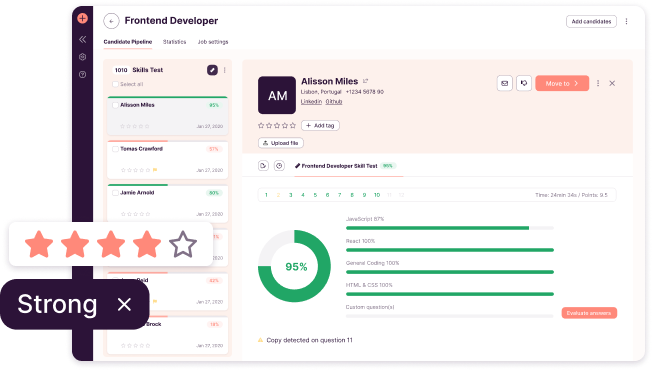
#5 – Expand your talent search
If you keep looking for talent in all the same places, don’t be surprised if your candidates are all the same. Your talent pools need to be diverse, and for that, cast your net wide(r).
For example, try hiring through niche job boards, employee referrals, targeted social media ads, industry networking events, LinkedIn, and others.
#6 – Build an inclusive employer brand
Start with the big picture and make fair chance hiring practices a part of your employer brand. Here are some ideas on how to present your company as an inclusive workplace:
- Communicate that you are dedicated to inclusion and diversity with a policy
- Educate all employees on DEI and its importance
- Invite leaders from underrepresented groups in your organization
- Use inclusive language in your job ads, career pages and About Us page
- Use social media to portray yourself as an inclusive employer
- Be transparent about how you hire and make hiring decisions
#7 – ‘Ban the box’ in application forms
Ban the Box is a fair chance hiring campaign launched back in the 1990s in the United States. The idea was to remove the check box that required candidates to state if they had a criminal record. For candidates with criminal records, these boxes made it more difficult to find a job. Additionally, this made them more likely to commit crimes once again.
Remove the check box for criminal records in your job applications to make your hiring process more fair. If someone excels at the work they do, the fact that they have a criminal record won’t affect their performance.
#8 – Ensure a consistent candidate experience
Make sure every candidate who applies for an opening has the same experience, regardless of their background, education, previous employment history, or other aspects.
The best way to do this is to start off with a skills assessment. Your applicants take a test, and all you can see are their results. You’re ensuring fair employment by doing the screening part in the most objective way possible. It’s the perfect example of meritocracy at work.
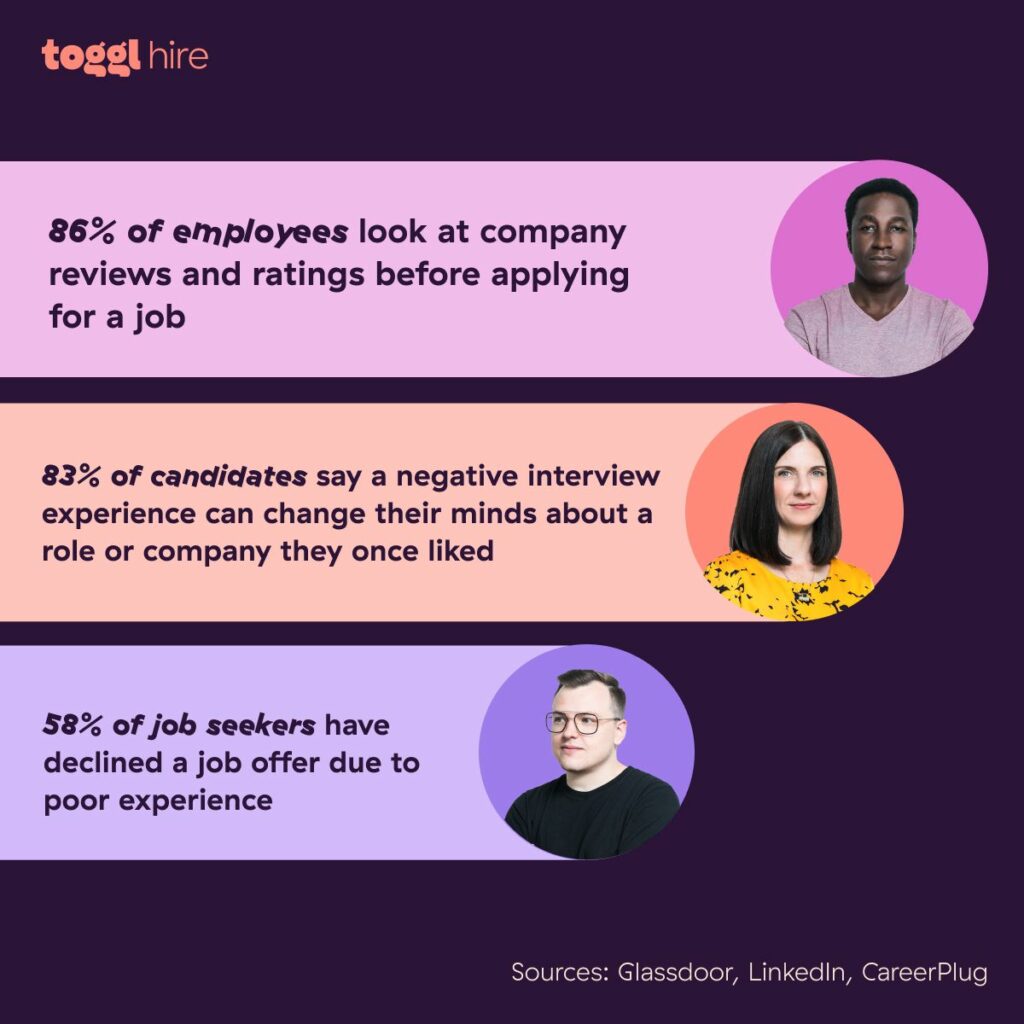
#9 – Create candidate transparency
Show the candidates exactly what they can expect throughout the hiring process. Tell them the steps they will go through within the job ad.
Let them know what happens when they apply and how soon they can expect a response. After they send in their resume or finish their skills test, let them know when someone is getting back to them. Show them your values and the kind of team you’re trying to build.
#10 – Benchmark against industry standards
To measure how your fair chance hiring efforts are paying off, compare your work against standards in your industry. Here are some metrics you can compare against:
- Hiring rate of applicants with criminal records
- Retention rate
- Turnover rate
- Promotion rates
- Salary parity
- Diversity and inclusion metrics
#11 – Regularly review and improve
As tools, processes, and laws change, so should your hiring practices. Hiring managers should continuously measure and refine fair chance hiring practices to grow a workforce that is more diverse, innovative, and productive over time.
Level up your fair hiring with Toggl Hire
Fair hiring practices are important for every single aspect of your company, from complying with the law to hiring better employees and improving your employer branding. Even though it might seem awfully complex, it doesn’t have to be.
Start your fair chance hiring process the right way by using a skills assessment test instead of a resume. With Toggl Hire, you can recruit based on skills rather than someone’s name, gender, age, education, or something else.
Follow fair chance hiring practices to get the best candidates! Browse our pre-built assessments to get started today!
Juste loves investigating through writing. A copywriter by trade, she spent the last ten years in startups, telling stories and building marketing teams. She works at Toggl Hire and writes about how businesses can recruit really great people.












